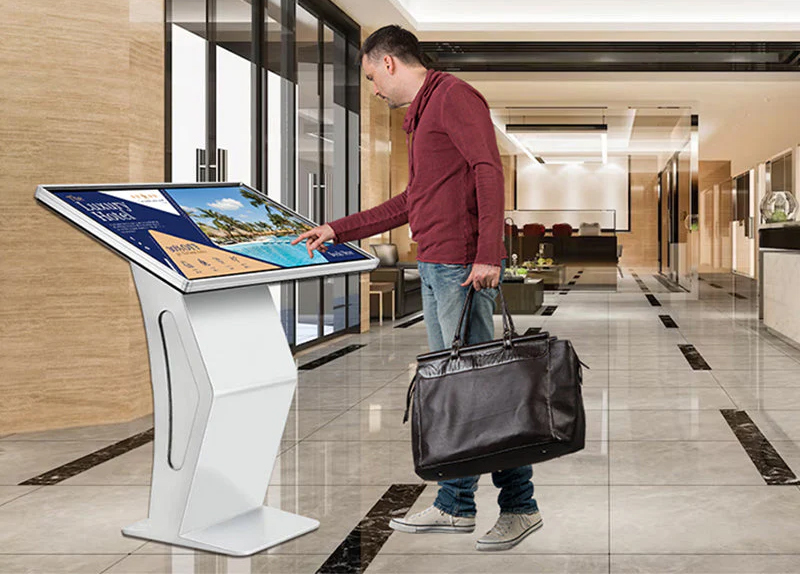The Ultimate Guide to K Type Digital Signage Kiosk
In today’s fast-paced digital world, businesses are constantly seeking innovative ways to attract attention and engage with customers. One solution that has quickly gained popularity is the K Type Digital Signage Kiosk. Whether you walk into a modern shopping mall, a high-tech office lobby, or even a hospital reception, chances are you’ve already interacted with one of these sleek kiosks.
But what exactly is a K Type Digital Signage Kiosk and why are businesses investing in them at record speed? This comprehensive guide will walk you through everything you need to know from features and benefits to industry applications and future trends.

What is a K Type Digital Signage Kiosk?
A K Type Digital Signage Kiosk is a free-standing, interactive display unit designed to showcase multimedia content, advertisements, real-time updates, and customer information. Unlike traditional posters or static signs, these kiosks combine digital screens, software integration, and touch-enabled features, making them dynamic and engaging.
Evolution of Digital Signage Technology
The journey of digital signage began with simple LED and LCD screens. Over the years, advancements in display resolution, cloud connectivity, and interactivity have transformed digital signage into a powerful business tool. Today, K Type kiosks stand at the forefront of this transformation, combining modern aesthetics with cutting-edge technology.
Key Features of K Type Digital Signage Kiosk
Sleek and Modern Design
The K Type kiosk is recognized for its elegant, free-standing structure that blends seamlessly with contemporary interiors. Its slim profile makes it suitable for retail stores, hotels, and airports without occupying excessive space.
Interactive Touch Screen Capabilities
Most models come with touch-screen technology, allowing customers to browse menus, find directions, or interact with product catalogs effortlessly.
High-Resolution Display and Brightness
With 4K resolution and high brightness panels, these kiosks ensure clear visibility even in brightly lit environments.
User-Friendly Software Integration
They support various operating systems and digital signage software, making it easy for businesses to schedule, manage, and display content.
Connectivity and Cloud-Based Management
Thanks to Wi-Fi, Bluetooth, and LAN support, content can be updated remotely, enabling businesses to run campaigns in real-time without manual intervention.
Advantages of K Type Digital Signage Kiosk
Enhanced Customer Engagement
Interactive kiosks create an immersive experience that captures customer attention and encourages longer interaction.
Cost-Effective Marketing Tool
Unlike traditional print media, digital kiosks allow unlimited updates without reprinting costs, saving businesses money in the long run.
Real-Time Content Updates
From live promotions to breaking news, businesses can push instant updates directly to kiosks, ensuring timely communication.
Multi-Industry Applications
Their adaptability makes them useful across multiple industries—retail, healthcare, hospitality, education, and transportation.
Use Cases Across Industries
Retail and Shopping Malls
Retailers use K Type kiosks for product showcases, digital catalogs, and interactive promotions that drive sales.
Hospitality and Restaurants
Hotels leverage kiosks for self-check-ins, while restaurants use them for digital menus and ordering systems.
Healthcare and Hospitals
Hospitals deploy kiosks for wayfinding, patient check-ins, and health awareness campaigns.
Transportation and Public Spaces
Airports and stations use them for digital maps, flight schedules, and ticketing services.
Corporate and Educational Institutions
Businesses and schools employ them for event information, announcements, and corporate branding.
K Type vs. Other Digital Signage Kiosks
Comparison with Wall-Mounted Displays
Unlike wall-mounted displays, K Type kiosks are mobile and interactive, offering flexibility in placement.
Differences from Interactive Tablets
While tablets are small and personal, kiosks are large, public-facing solutions ideal for commercial use.
Why Businesses Prefer K Type Kiosks
Businesses choose K Type kiosks because they offer a balance of design, functionality, and scalability.
Choosing the Right K Type Digital Signage Kiosk
Factors to Consider Before Purchase
-
Screen size and resolution
-
Touch vs. non-touch capability
-
Indoor vs. outdoor usage
-
Software compatibility
Customization Options Available
Manufacturers often provide custom branding, color options, and hardware configurations.
Installation and Maintenance Tips
Ensure professional installation, regular updates, and periodic maintenance to maximize performance.
Future Trends in Digital Signage Kiosks
AI-Powered Personalization
AI will allow kiosks to deliver personalized recommendations based on customer behavior.
Integration with IoT and Smart Systems
Smart integration will enable real-time data exchange with other connected devices.
Sustainability and Energy Efficiency
Future kiosks will focus on low energy consumption and eco-friendly materials.
FAQs on K Type Digital Signage Kiosk
Q1: What makes K Type kiosks different?
They combine modern design, interactivity, and advanced connectivity in one unit.
Q2: Can they support multi-language interfaces?
Yes, most kiosks offer multi-language software support for global businesses.
Q3: Are K Type kiosks suitable for outdoor use?
Some models are weatherproof and designed for outdoor environments.
Q4: How easy is it to update content remotely?
With cloud-based software, businesses can update content instantly from anywhere.
Q5: Do they work with third-party software?
Yes, they are compatible with most digital signage platforms and apps.
Q6: What is the typical lifespan of a K Type kiosk?
On average, a kiosk lasts 5–7 years with proper maintenance.
Conclusion: Why Invest in a K Type Digital Signage Kiosk Today
The K Type Digital Signage Kiosk isn’t just another tech gadget—it’s a powerful communication tool that combines branding, marketing, and customer engagement into one elegant package. Businesses that adopt this technology can stay ahead of the competition, improve customer experiences, and reduce long-term costs.
As digital transformation continues, investing in a K Type kiosk today means preparing your business for the future of smart, interactive communication.
